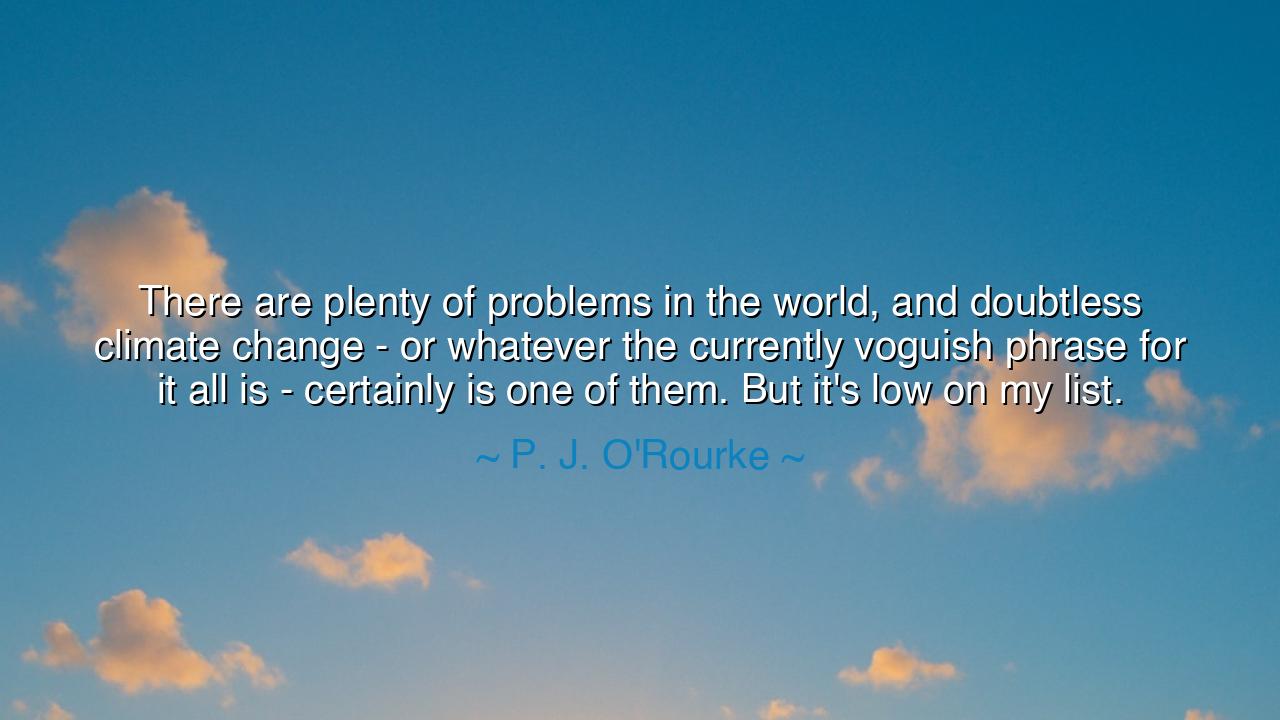
There are plenty of problems in the world, and doubtless climate
There are plenty of problems in the world, and doubtless climate change - or whatever the currently voguish phrase for it all is - certainly is one of them. But it's low on my list.






“There are plenty of problems in the world, and doubtless climate change—or whatever the currently voguish phrase for it all is—certainly is one of them. But it’s low on my list.” Thus spoke P. J. O’Rourke, with his sharp wit and worldly weariness, a man who looked upon the chaos of his age with both humor and skepticism. His words, though laced with irony, echo a timeless tension within the human spirit: the struggle to discern what matters most when the world groans beneath a thousand burdens. To understand this saying aright is not merely to debate priorities—it is to examine the heart of human perception, and how easily urgency is dimmed by familiarity.
In this age—and indeed, in every age—mankind faces a multitude of problems: hunger, war, poverty, corruption, and now the slow, unseen menace of climate change. To the weary eye, it all becomes a sea of troubles, and a man, like O’Rourke, might look upon the horizon and say, “There are too many storms to chase.” His remark was not born of cruelty, but of the fatigue that comes from watching humanity wrestle endlessly with its own mistakes. He saw a world so tangled in politics and vanity that even noble causes became “voguish phrases”, worn like garments of fashion rather than banners of conviction.
Yet beneath his jest lies a deeper warning. For when we dismiss one danger because others clamor louder, we risk blindness to the slow fires that burn beneath our feet. The ancients knew this well. The fall of civilizations seldom came from a single blow, but from neglect—fields left barren, waters fouled, forests stripped of life. Like Rome, which crumbled not in one day of ruin but in centuries of decay, the Earth too will wither not from one disaster, but from countless small indifferences. Thus, O’Rourke’s quote, though cynical, calls us to reflect: how often do we rank the world’s crises not by truth, but by what feels convenient to face?
Consider the tale of Easter Island, where a great people once carved colossal statues to honor their gods, even as their forests vanished and their soil turned to dust. To them, the loss of a single tree was small beside the grandeur of their monuments. But soon, there were no trees left to build canoes, no birds left to sing, no harvest to reap. Their greatness fell silent, buried beneath the weight of their own neglect. In their story lives the echo of our own: the peril of treating the climate, the Earth, and the future as matters low upon our list.
And yet, there is also wisdom in O’Rourke’s irreverence. For his humor reminds us not to surrender to despair, even when the problems of the world seem endless. It is easy to be crushed by guilt, to feel that every breath harms the planet and every act is too small to matter. But despair, too, is a kind of apathy. The ancients taught moderation in all things—including sorrow. The wise do not carry the weight of every problem at once; they choose one cause, one act, one stone to lift, and in doing so, they begin to move the mountain.
Thus, the lesson is twofold. We must neither dismiss the Earth’s suffering as trivial nor drown ourselves in the vastness of its pain. To live wisely is to act where we can, to awaken where others slumber. Plant a tree. Reduce waste. Speak truth even when it is unfashionable. For though climate change may seem distant to some, its hand reaches quietly into every field, every sea, every life. The smallest gesture of care, multiplied across nations, becomes a force greater than any indifference.
Let us then not mock the phrase, nor chase fashion, but seek sincerity. Let us not let weariness blind us to danger, nor let pride keep us from compassion. For the Earth is our oldest inheritance and our final home. To place her low upon our list is to forget that all life—our own included—springs from her breath. In the end, O’Rourke’s words remind us of this paradox: that even the jester, in jesting, speaks truth. The world is full of problems, yes—but the greatest of them all is forgetting which ones sustain life itself.
Therefore, O listener, rise above indifference. Laugh if you must, but act nonetheless. For though the earth turns slowly, her patience is not eternal. The time for care is now. And as long as we live beneath the same sun, walk the same soil, and breathe the same air, let no one—no matter how clever—convince us that the fate of the Earth belongs low on any list.






AAdministratorAdministrator
Welcome, honored guests. Please leave a comment, we will respond soon